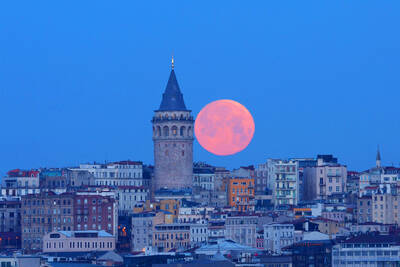Handcuffs during pregnancy, separation from newborn babies and insufficient care for elderly inmates are among the abuses suffered by women incarcerated in Japan, Human Rights Watch (HRW) said yesterday.
Female inmates are sometimes shackled during labor and immediately after birth, the international non-governmental organization (NGO) said in a new report, based on interviews with nearly 60 formerly jailed women.
The Japanese Ministry of Justice denied some of the claims, saying that restraints are “not used when imprisoned women are breastfeeding, holding, bathing, or changing the baby’s diapers,” the report said.

Photo: EPA
It also said that “appropriate medical measures are taken for prisoners.”
New mothers also often have their babies taken away from them soon after birth, HRW said.
“Many women imprisoned in Japan suffer serious human rights abuse and mistreatment,” the rights group said.
Nearly 4,000 women were behind bars in Japan as of 2021, mostly over theft and drug-related offenses.
Ministry data showed that only three out of 184 women who gave birth while incarcerated were granted access to their babies in prison between 2011 and 2017.
“Separation at birth can be traumatizing and harm the health of both the mother and infant and can interfere with breastfeeding and parent-child bonding,” the NGO said.
While the law permits mothers to ask to keep their children with them for at least one year, prison authorities “rarely inform” women of that right, HRW said.
In Japan, pregnant prisoners are typically taken to a hospital to give birth, but they are generally handcuffed before entering and after exiting the delivery room, the ministry told HRW.
This means Japan “has not met the international best practice,” the group said.
At one prison in Saga region, in southwestern Japan, inmates interviewed by HRW said that women were handcuffed even as they gave birth, contravening a 2014 government notice against the practice.
HRW said the ministry denied this allegation, saying that it had “found no record” of women being handcuffed inside delivery rooms after 2014.
It also said the prison system “does not cater for the needs of the increasing number of older people,” warning of bullying by cellmates and guards frustrated with some prisoners’ limited mobility.
Japan’s prison population has aged rapidly in recent years, especially its female prison population. Government figures show 20 percent of women admitted to prison in 2021 were 65 or older, compared with 13 percent of men.
“Some older women repeatedly commit non-violent crimes such as shoplifting because of social isolation and loneliness,” HRW said.
Other problems detailed in the report range from poor prison healthcare to punishment through solitary confinement and mistreatment of transgender inmates.
Many women convicted of petty crimes are being imprisoned only because Japan lacks alternatives such as community service, HRW said.
“Japan should consider alternatives to imprisonment while moving to decriminalize simple drug-related violations,” said Teppei Kasai, Tokyo-based program officer for HRW’s Asia division.

ANGER: A video shared online showed residents in a neighborhood confronting the national security minister, attempting to drag her toward floodwaters Argentina’s port city of Bahia Blanca has been “destroyed” after being pummeled by a year’s worth of rain in a matter of hours, killing 13 and driving hundreds from their homes, authorities said on Saturday. Two young girls — reportedly aged four and one — were missing after possibly being swept away by floodwaters in the wake of Friday’s storm. The deluge left hospital rooms underwater, turned neighborhoods into islands and cut electricity to swaths of the city. Argentine Minister of National Security Patricia Bullrich said Bahia Blanca was “destroyed.” The death toll rose to 13 on Saturday, up from 10 on Friday, authorities

RARE EVENT: While some cultures have a negative view of eclipses, others see them as a chance to show how people can work together, a scientist said Stargazers across a swathe of the world marveled at a dramatic red “Blood Moon” during a rare total lunar eclipse in the early hours of yesterday morning. The celestial spectacle was visible in the Americas and Pacific and Atlantic oceans, as well as in the westernmost parts of Europe and Africa. The phenomenon happens when the sun, Earth and moon line up, causing our planet to cast a giant shadow across its satellite. But as the Earth’s shadow crept across the moon, it did not entirely blot out its white glow — instead the moon glowed a reddish color. This is because the

DEBT BREAK: Friedrich Merz has vowed to do ‘whatever it takes’ to free up more money for defense and infrastructure at a time of growing geopolitical uncertainty Germany’s likely next leader Friedrich Merz was set yesterday to defend his unprecedented plans to massively ramp up defense and infrastructure spending in the Bundestag as lawmakers begin debating the proposals. Merz unveiled the plans last week, vowing his center-right Christian Democratic Union (CDU)/Christian Social Union (CSU) bloc and the center-left Social Democratic Party (SPD) — in talks to form a coalition after last month’s elections — would quickly push them through before the end of the current legislature. Fraying Europe-US ties under US President Donald Trump have fueled calls for Germany, long dependent on the US security umbrella, to quickly

Local officials from Russia’s ruling party have caused controversy by presenting mothers of soldiers killed in Ukraine with gifts of meat grinders, an appliance widely used to describe Russia’s brutal tactics on the front line. The United Russia party in the northern Murmansk region posted photographs on social media showing officials smiling as they visited bereaved mothers with gifts of flowers and boxed meat grinders for International Women’s Day on Saturday, which is widely celebrated in Russia. The post included a message thanking the “dear moms” for their “strength of spirit and the love you put into bringing up your sons.” It